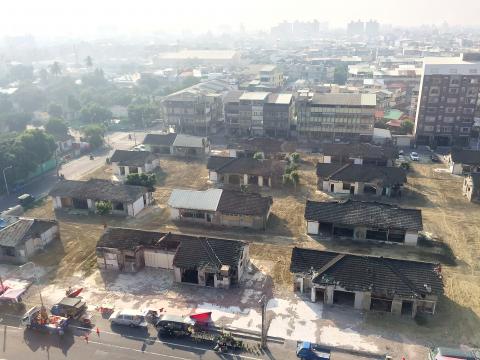The NT$1 billion (US$34.4 million) cost of restoring barracks at a Japanese-era military airport in Pingtung County is a major funding challenge, county officials said.
Over the past 10 years, 135 of the 149 airport barracks built by the Japanese in 1920 have been placed under the Cultural Heritage Protection Act (文化資產保存法).
“It’s not only about the artistic value of Japanese architecture — this is also about Taiwan’s aviation history,” former barracks resident Yeh Ching-yuan (葉慶元) said.

Photo: Lo Sin-chen, Taipei Times
The airport was built to meet the defense needs of the Japanese government, and family barracks for the families of Imperial Japanese Army Air Service officers were built between 1927 and 1937.
The airport and barracks were taken over by the Republic of China Air Force after World War II, with the families of air force and army officers living there in the years that followed.
The county government in 2007 listed 71 buildings from the Shengli (勝利) and Chongren (崇仁) military dependents’ villages as cultural heritage sites, following demands from conservationists.
Last year, 64 additional buildings from Shengli, Chongren, Sianguang (憲光) and Desheng (得勝) villages were also added to the list by the county’s Cultural Affairs Bureau.
The 135 barracks represent the largest collection of Japanese-era living quarters in one spot anywhere in the country, Pingtung Citizen Association secretary-general Chou Jui-yu (周芮宇) said.
The act has been crucial in saving these and other historic buildings throughout the country, as it stipulates that buildings older than 50 years on public land must undergo evaluation by authorized officials, she said.
The county needs to attract more talented officials to effectively manage the properties, she said, adding that thieves had already broken into the barracks at Desheng, stealing pillars and door frames.
Work on the first 71 buildings to be listed progressed at a snail’s pace due to lack of funding, but began to pick up last year after receiving provisions from the Forward-looking Infrastructure Development Project, she said.
The county plans to complete restoration work on the first 20 buildings this year at an estimated cost of NT$100 million, with the remainder expected to be finished by next year through an injection of NT$485 million from the Ministry of Culture, she said.
The bureau said it is not planning to restore all of the 64 most recently listed buildings, citing extensive damage to some of them.
Those that are to remain unrestored would be protected in their current state, which would cost the county significantly less money, the bureau said, adding that it would apply to the central government for financial assistance in protecting the buildings.

US climber Alex Honnold is to attempt to scale Taipei 101 without a rope and harness in a live Netflix special on Jan. 24, the streaming platform announced on Wednesday. Accounting for the time difference, the two-hour broadcast of Honnold’s climb, called Skyscraper Live, is to air on Jan. 23 in the US, Netflix said in a statement. Honnold, 40, was the first person ever to free solo climb the 900m El Capitan rock formation in Yosemite National Park — a feat that was recorded and later made into the 2018 documentary film Free Solo. Netflix previewed Skyscraper Live in October, after videos

NUMBERS IMBALANCE: More than 4 million Taiwanese have visited China this year, while only about half a million Chinese have visited here Beijing has yet to respond to Taiwan’s requests for negotiation over matters related to the recovery of cross-strait tourism, the Tourism Administration said yesterday. Taiwan’s tourism authority issued the statement after Chinese-language daily the China Times reported yesterday that the government’s policy of banning group tours to China does not stop Taiwanese from visiting the country. As of October, more than 4.2 million had traveled to China this year, exceeding last year. Beijing estimated the number of Taiwanese tourists in China could reach 4.5 million this year. By contrast, only 500,000 Chinese tourists are expected in Taiwan, the report said. The report

Temperatures are forecast to drop steadily as a continental cold air mass moves across Taiwan, with some areas also likely to see heavy rainfall, the Central Weather Administration (CWA) said. From today through early tomorrow, a cold air mass would keep temperatures low across central and northern Taiwan, and the eastern half of Taiwan proper, with isolated brief showers forecast along Keelung’s north coast, Taipei and New Taipei City’s mountainous areas and eastern Taiwan, it said. Lows of 11°C to 15°C are forecast in central and northern Taiwan, Yilan County, and the outlying Kinmen and Lienchiang (Matsu) counties, and 14°C to 17°C

STEERING FAILURE: The first boat of its class is experiencing teething issues as it readies for acceptance by the navy, according to a recent story about rudder failure The Hai Kun (海鯤), the nation’s first locally built submarine, allegedly suffered a total failure of stern hydraulic systems during the second round of sea acceptance trials on June 26, and sailors were forced to manually operate the X-rudder to turn the submarine and return to port, news Web site Mirror Daily reported yesterday. The report said that tugboats following the Hai Kun assisted the submarine in avoiding collisions with other ships due to the X-rudder malfunctioning. At the time of the report, the submarine had completed its trials and was scheduled to begin diving and surfacing tests in shallow areas. The X-rudder,